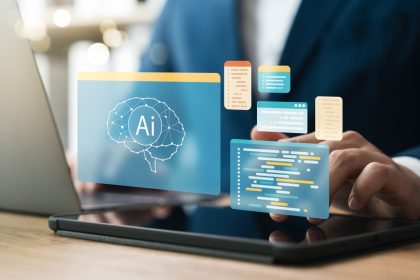
The future of AI at Apple
The landscape of artificial intelligence is rapidly evolving, and Apple stands at a pivotal point as it shapes its artificial intelligence strategy. While tech giants like Google, Microsoft, and Amazon charge ahead with ambitious artificial intelligence implementations, Apple’s trajectory remains under intense scrutiny. As the company works to integrate advanced artificial intelligence capabilities into its ecosystem, particularly through Siri and iPhone features, many are curious about how Apple will balance innovation with its long-standing commitment to user privacy.
The potential for artificial intelligence transformation
Apple’s approach to artificial intelligence has always been distinct. The company prioritizes on-device processing and user privacy, setting it apart from competitors who often rely heavily on cloud-based solutions. This unique philosophy could define how Apple’s artificial intelligence evolves, with the potential to introduce groundbreaking features that respect user data while enhancing the iPhone experience.
Understanding Apple’s artificial intelligence framework
Apple is likely to focus on several strategic areas as it develops its artificial intelligence capabilities. These areas could redefine how users interact with their devices:
- Enhanced Siri capabilities: Apple’s voice assistant has room for growth in understanding and responding to complex queries.
- Improved natural language processing: This could enable more fluid and intuitive interactions across apps and devices.
- Advanced photo and video editing features: AI-powered tools might provide professional-grade editing options for everyday users.
- Smarter device automation: Artificial intelligence could make automations more adaptive and personalized to individual habits.
- More personalized user experiences: Tailored recommendations and features could enhance how devices adapt to each user’s needs.
Privacy-first AI development
One of Apple’s core values is its commitment to user privacy. This ethos will undoubtedly guide its artificial intelligence advancements. By prioritizing on-device processing, Apple can minimize data transfer to external servers, reducing privacy risks. Features requiring cloud-based functionality would likely adhere to Apple’s rigorous standards for encryption and anonymization.
Potential impact on user experience
If Apple introduces significant artificial intelligence enhancements, users can expect transformative changes in several areas:
Digital assistant capabilities
Siri could evolve to better understand context, handle more complex commands, and offer seamless interactions that rival human conversation.
Photography and video
AI-powered editing tools could simplify the creation of professional-looking photos and videos. Features like automated scene adjustments and real-time filters might become standard.
Productivity features
Advanced artificial intelligence could streamline everyday tasks, such as drafting emails, summarizing documents, or managing schedules.
Device optimization
By leveraging artificial intelligence for smarter resource allocation, Apple could enhance device performance and battery life, ensuring a smoother experience.
Accessibility improvements
Enhanced artificial intelligence capabilities could revolutionize accessibility features, making Apple devices even more inclusive for users with disabilities.
Technical considerations
With the potential for robust artificial intelligence features, certain technical factors could come into play:
Device compatibility: Older models might not support advanced features, encouraging upgrades.
Storage requirements: artificial intelligence enhancements could require additional space for data and processing.
Processing power: New features might necessitate hardware with greater computational capabilities.
Software updates: Regular updates would ensure access to the latest artificial intelligence improvements.
Connectivity needs: Some features may depend on stable internet access.
Industry implications
Apple’s moves in artificial intelligence will undoubtedly ripple through the industry, influencing:
Competition: Competitors may feel pressure to innovate further to match Apple’s privacy-focused artificial intelligence.
Standards: Apple’s implementation could set benchmarks for ethical artificial intelligence use.
Privacy norms: Strong privacy features might push rivals to reconsider their data practices.
User expectations: Apple’s loyal user base might come to expect artificial intelligence advancements across all devices.
App development: Developers may create apps optimized for Apple’s new artificial intelligence capabilities, enriching the ecosystem.
Factors influencing Apple’s AI trajectory
While the timeline for Apple’s AI rollout remains uncertain, several factors will shape its progress:
Advances in AI research: Emerging technologies will open new possibilities.
Privacy concerns: Apple’s adherence to privacy standards will guide its development.
Market competition: Rivals’ advancements might accelerate Apple’s timeline.
Regulatory considerations: Compliance with global data protection laws will be crucial.
Hardware innovations: New devices with AI-optimized components could expand capabilities.
Preparing for artificial intelligence advancements
As Apple gears up for potential artificial intelligence innovations, users can take steps to stay ready:
Keep devices updated: Regular updates ensure access to new features.
Manage storage wisely: Free up space to accommodate future enhancements.
Understand privacy settings: Familiarize yourself with options to maintain control over personal data.
Follow tech news: Stay informed about announcements and upcoming features.
Back up data regularly: Protect important files before significant updates.
The broader context
Artificial intelligence is reshaping how we interact with technology, and Apple’s approach could have lasting effects. By maintaining its focus on user privacy and experience, Apple has the potential to redefine what artificial intelligence integration looks like in consumer devices. Whether through smarter Siri interactions, advanced photography tools, or enhanced accessibility, Apple’s artificial intelligence could mark a new chapter in the evolution of personal technology.
Conclusion
While details remain speculative, Apple’s history suggests any artificial intelligence developments will prioritize practical benefits and robust privacy protections. As users anticipate these advancements, they can prepare by optimizing their devices and staying informed. The integration of artificial intelligence into Apple’s ecosystem holds the promise of not only transforming user experiences but also setting new standards for innovation in the tech industry.














